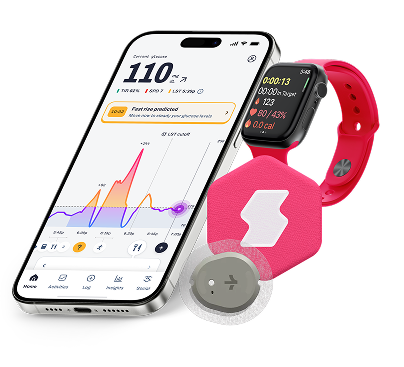Corn tortillas, a staple in many Latin American cuisines, offer a nutritious alternative to flour-based options. Despite their carbohydrate content, corn tortillas typically have a lower glycemic index, making them a favorable choice for individuals managing their blood sugar levels.¹ Additionally, they are rich in dietary fiber and essential nutrients like magnesium and B vitamins, which can contribute to overall health and well-being.² Understanding the impact of corn tortillas on glycemic response is crucial for individuals seeking to make informed dietary choices, particularly those with diabetes.
Sign up to be the first to know about special offers and exciting Signos news.
Glycemic Index Table
To calculate the glycemic index (GI) of corn tortillas, we first need to establish the carbohydrate content per serving. According to the USDA FoodData Central, 100g of corn tortillas contains approximately 21g of carbohydrates.² The glycemic load (GL) per serving can then be calculated using the formula: GI x Carbohydrate per Serving / 100.
Given the GI of corn tortillas can vary depending on factors like processing and cooking methods, a specific value may not be readily available. However, it's generally accepted that corn tortillas have a lower glycemic index compared to flour tortillas due to their higher fiber content and slower digestion.¹
Using the average GI value for corn tortillas of around 52 and the carbohydrate content per serving (100g), we can estimate the glycemic load per serving.¹
GI = 52 (estimated)
Carbohydrate per Serving = 21g¹
GL = (52 x 21) / 100 = 10.92
So, for a serving size of 100g of corn tortillas, the estimated glycemic load would be approximately 10.92.

Nutritional Facts
Corn tortillas offer a nutritious profile, serving as a good source of carbohydrates while also containing dietary fiber, protein, and essential micronutrients such as calcium, iron, and B vitamins. A 100g serving typically provides approximately 21g of carbohydrates, 2.4g of fiber, and 4.2g of protein, along with small amounts of fat and various vitamins and minerals.² Incorporating corn tortillas into one's diet can contribute to overall nutrient intake and support healthy eating habits.
The nutritional information below is for 100 g of corn tortillas.²
Nutritional Facts

Are Corn Tortillas Good for Weight Loss?
Corn tortillas can be a beneficial addition to a weight loss diet when consumed in moderation as part of a balanced meal plan. They are typically lower in calories and fat compared to flour tortillas, making them a suitable option for those looking to manage their weight.²
Additionally, corn tortillas provide dietary fiber, which can promote feelings of fullness and aid in appetite control.³ However, portion sizes and the choice of fillings should be considered to ensure overall calorie intake aligns with weight loss goals.
Are Corn Tortillas Good for People Living with Diabetes?
Corn tortillas can be a safe option for individuals with diabetes when consumed in moderation as part of a balanced diet. They typically have a lower glycemic index compared to flour tortillas, meaning they cause a slower and more gradual increase in blood sugar levels.¹ Additionally, corn tortillas provide dietary fiber, which can help regulate blood sugar levels and improve overall glycemic control.² However, portion size and toppings should be considered to manage carbohydrate intake effectively.
Better health starts here.
Sign up for tips and insights that work for you!
Allergies
Allergies to corn tortillas, although relatively rare, can occur and may manifest as symptoms such as hives, digestive issues, or, in severe cases, anaphylaxis. These allergies are typically triggered by proteins found in corn, such as zein and lipid transfer proteins. It's essential for individuals with known corn allergies to carefully read ingredient labels and seek medical advice if they experience any adverse reactions.

References
References
- The University of Sydney. (2023, May 1). Glycemic Index – Glycemic Index Research and GI News. https://glycemicindex.com/
- USDA FoodData Central. (2020, October 30). Food Details - Tortilla, corn. https://fdc.nal.usda.gov/fdc-app.html#/food-details/1100857/nutrients
- Slavin J. L. (2005). Dietary fiber and body weight. Nutrition (Burbank, Los Angeles County, Calif.), 21(3), 411–418. https://doi.org/10.1016/j.nut.2004.08.018




.svg)
.svg)
.svg)
.svg)
.svg)
.svg)
.svg)
.svg)
